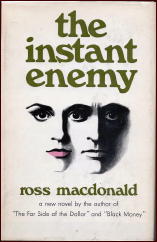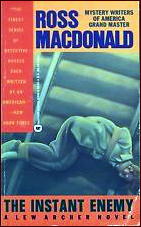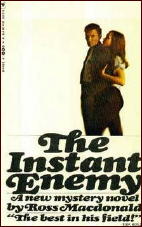Mon 10 Feb 2014

ROSS MACDONALD – The Instant Enemy. Alfred A. Knopf, hardcover, 1968. Reprinted many times.
In many ways The Instant Enemy is typical of Macdonald’s entire output, in that the emphasis is on story and plot, and the personality of the detective, one Lew Archer, hardly ever enters into it.
Archer, in other words, is an observer, and we never get much of an insight into what makes him tick. One exception I noted was on page 112 (in the Warner paperback edition I read), where the possibility of getting paid $100,000 jars Archer into the unexpected realization that maybe he might even retire.

That’s probably a million dollars in today’s money, and he feels pretty good about the idea. The moments lasts for only a page, though, and then it’s back to the case on hand. It starts out simply enough — he’s hired to bring back a runaway daughter who’s gone off with a psycho boy friend with a sawed-off shotgun.
Things are never that simple in a Ross Macdonald book, however, and soon all sorts of entanglements with the past begin to emerge, like pulling a root out of a sewer pipe and finding you’re dragging the whole tree out with it. If trees had Oedipus fixations, I think the analogy would be complete. (See page 146.)

Although Instant Enemy is much like all of Macdonald’s other books, and the ending is absolutely terrific, I don’t think this is one of his better ones. (Those of you you’ve read them all recently, please feel free to contradict me on this.) I think it may be the pacing. It’s relentless; it doesn’t give up for a minute; and if you’re so minded, it could become downright monotonous.
Archer is on the go from the beginning of the book to the end. When he’s tired for a moment, he pulls over to a motel and sleeps for a couple of hours, and then he’s on the road again. I think a good many readers are going to feel the need to pull over themselves, right about the three-quarters mark.
If I’m right about this, and maybe I’m not, second-rate Macdonald is still number-one goods, but in this particular case, the really prime stiff is all at the end. People who prefer the light frothy sort of mystery simply aren’t going to get there.
February 11th, 2014 at 12:33 am
I’ve always liked Ross Macdonald especially the Lew Archer novels. I read most of them as they were published starting in the late 1950’s. I reread them somewhere in the 1980’s and 1990’s and still thought they were excellent.
About three years ago I thought I’d read a couple and see if they held up to a third reading and if I still thought Macdonald to be exceptional.
I ended up reading all 18 Lew Archer novels one after another with no problem or lack of enthusiasm. Usually with series characters I reach a burn out point. I may start off liking a series but after a certain point, I end up saying OK enough.
This has happened for instance with Robert Parker. I started off liking the first few novels alot but after awhile I ended up hating Susan and Hawk and not being able to believe in them at all.
This has never happened with Ross Macdonald and his Lew Archer series. After all these years the fact that I can read the novels one after another means that Macdonald is something special to me. The same thing with Raymond Chandler and even Rex Stout and his Nero Wolfe and Archie series.
But these series are exceptions with me.
February 11th, 2014 at 12:46 am
Macdonald clearly ‘holds up’ to rereading, and my favorites among his work are numerous, but this one isn’t one of them. The word I associate with it is tired. That isn’t to say it isn’t better than 90% of what everyone else was doing in the genre, only that it wasn’t top Macdonald or for me even second tier Macdonald.
Even Macdonald admitted Archer was more a voice, even a cypher, than a person. To some extent take away the language and there’s no there there. That was deliberate in an attempt to avoid Archer having the kind of plot overwhelming presence of Philip Marlowe, but for me it was a miscalculation, though one of the few.
Walker,
I had the same experience with Parker and the smug self satisfaction of Spenser, Susan, and Hawk, the Seinfeld, Elaine, and George Costanza of crime fiction. By later in the novels they were contrived and fatuous as far as I was concerned. Luckily Parker turned to some other series characters and his westerns and brought me back a little, but for no real reason I found myself actively disliking Spenser and company on an almost visceral level.